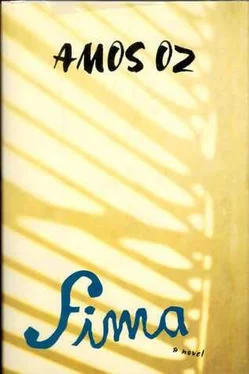"I'll give you sixty seconds to tell me what's wrong, and if you don't, I'm going to leave you here by yourself."
"Go then," said Dimi.
"Very well then," Fima snapped, attempting to imitate Ted's strictness and even his accent. "I'm going. Okay. But before I go, you've got exactly four minutes on the clock to get ready and into bed. And no fuss. Teeth, glass of milk, pajamas, Valium, the lot. And no more ridiculous scenes."
"You're the one who's making ridiculous scenes," said Dimi.
Fima walked out of the room and made his way to Ted's study. He had no intention of leaving the sick child alone. On the other hand, he had no idea how to retract his ultimatum, so he sat down on Teddy's padded chair in front of the computer, without turning the light on, and urged himself to think rationally. There were only two possibilities: either the child was developing some illness and needed immediate treatment, or he was tormenting him on purpose, and he, Fima, was behaving like a clown. Suddenly he felt full of pity for the pale, tortured Challenger. And for himself too: "They hadn't even bothered to leave a phone number. They're probably having a night out in Tel Aviv, living it up in some exotic restaurant or nightclub, without so much as a thought for us. What if something terrible is happening? How can I get hold of them? What if he's swallowed something? Caught a lethal virus? Appendicitis? Polio? Or perhaps it's his parents who are in trouble? A car crash on the way back to Jerusalem? Or a terrorist attack?"
Fima made up his mind to ask the downstairs neighbor. On second thought he did not know what he could say to her, and was afraid of again making a fool of himself.
So he walked back sheepishly to the living room and wheedled:
"Are you angry with me, Dimi? Why are you doing this to me?"
A ghost of a tired old man's smile flitted across the child's mouth. In a factual tone he remarked:
"You're bugging me."
"In that case," Fima said, fighting back a fresh wave of fury, a mighty urge to give this devious, impertinent creature a small slap across the face, "you can be bored all by yourself. Good night. I'll forget you."
But instead of leaving he feverishly pulled down from the shelf the first book his fingers encountered. It turned out to be an orange-bound tome in English on the history of Alaska in the eighteenth or nineteenth century. Collapsing onto the couch, he began to leaf through it, straining to take in the pictures at least. He made up his mind to pay no attention to the little enemy. But he had trouble concentrating. Every now and then he peeked at his watch. Whenever he looked, it was always twenty-five past nine, and he was furious not only because time seemed to be standing still but also because he had missed the news. A sense of disaster weighed on his chest like a stone. Something really bad is happening. Something you are going to regret bitterly. Something that will eat away at you for days and years, while you wish in vain that you could turn back the clock to this moment and correct the terrible error. To do the simple, obvious thing that only a blind man or an idiot would not be doing now. But what is that thing? Time and again he stole a glance at Dimi, who was lying inside his den of cushions in the armchair, blinking. Eventually he managed to latch onto the story of the early whale hunters who reached Alaska from New England and set up beach stations that were often attacked by savage nomads who had crossed the Bering Straits from Siberia. And suddenly Dimi said:
"Tell me something. What's edema?"
"I don't know exactly," said Fima. "It's the name of an illness. Why?"
"What kind of illness?"
"Show me where it hurts. Fetch the thermometer. I'll call a doctor."
"Not me," said Dimi. "Winston."
"Who's Winston?" It occurred to Fima that the child might be delirious. To his surprise this discovery made him feel easier. Now, how could he get hold of a doctor? Call Tamar and ask her advice. Not our doctors, that's for sure. Not Annette's husband, either. And anyway, what was edema?
"Winston's a dog. Tslil Weintraub's dog."
"Is the dog ill?"
"He was."
"And you're afraid you may have caught it?"
"No. We killed him."
"Killed him? Why did you do that?"
"They said he had edema."
"Who killed him?"
"Only he isn't dead."
"He's not alive and he's not dead."
"He's alive and he's also dead."
"Will you explain that to me?"
"I can't explain."
Fima stood up and put one hand on Dimi's forehead and the other on his own. He couldn't feel any difference. Maybe they were both ill?
"It was murder," said Dimi. And suddenly, horrified by what had come out of his mouth, he snatched another cushion and, hiding his face behind it, began to sob. Broken, strangled gasps that sounded like hiccups. Fima tried to pull the cushion away, but Dimi held fast to it and would not let go, so he gave up. And he realized that there was no illness, no fever, but suffering that required patience and silence. He sat down on the rug in front of the armchair and took Dimi's hand, feeling that he too was close to tears and that he loved this weird child with his thick glasses and paper-white hair, his stubbornness, his knowingness, his perpetual air of solitary, premature old age. Fima's body ached from holding back the urge to snatch the sobbing creature up from the armchair and squeeze him to his chest with all his strength. Never in his life had he felt such a strong desire to press himself against a woman's body as he felt now to hold Dimi. But he controlled himself and did not stir so long as the gasps continued. Until Dimi stopped. And, oddly, it was just when he fell silent that Fima said gently:
"That's enough now, Dimi."
Suddenly the child slid out of the chair and into his arms. He huddled against Fima so hard, he seemed to be burrowing inside him. And he said:
"I will tell."
And he began to talk, clearly, in a soft, steady voice, without any more sobs and without halting for a moment to search for a word, even blinking less than before, about how they had found the dog crouching in the dirt among the trash cans. A repulsive sort of dog, with a mangy back, with open wounds and flies on one of his hind legs. Once he had belonged to a friend of theirs, Tslil Weintraub, but ever since the Weintraubs went abroad he belonged to nobody. He just lived on scraps. The dog was lying on his side behind the cans, coughing like someone who smokes too much. They gave him a medical examination, and Yaniv said, "He's going to die soon, he's got edema." Then they forced his mouth open and made him swallow a spoonful of a medicine invented by Ninja Marmelstein: muddy water from the pond mixed with a little sand and leaves and a little powdery cement and some aspirin from Yaniv's mother. Then they decided to carry him down to the wadi in a blanket and do the sacrifice of Isaac with him as they learned in Bible. It was Ronen's idea, and he even ran home and got a bread knife. All the way to the wadi this Winston lay quietly in the blanket. Actually he seemed happy, wagging his tail gratefully. Maybe he thought they were taking him to the vet. Anyone who came close to him got a lick on his face or his hands. In the wadi they collected stones and built an altar, and they put the unresisting dog on it. He looked at them all with a kind of curiosity, like a baby, trustingly, as though he was sure he was among loving friends, or as if he understood the game and was glad to be playing. His wounds were revolting, but his face was cute, with brown eyes that showed sense and feeling. "There's this thing sometimes — isn't that right, Fima? — when you look at an animal and you think it can remember things that human beings have forgotten. Or at least it looks like it." Anyway, he was a dirty, rather irritating dog, covered with fleas and ticks, always fawning on everyone; he loved to put his head on your knees and drool.
Читать дальше












